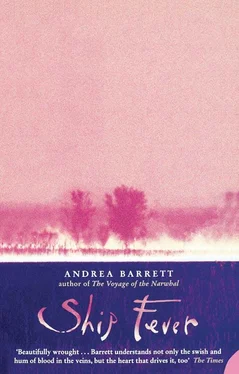She had fallen sick before they reached the Gaspé Peninsula and Anticosti Island, and although she had not taken to her bed at first — there being no bed for her to go to — she had spent the days after they entered the St. Lawrence reeling between the deck and the hold. On deck she’d stared at a cabin passenger, neat and clean and well-fed, sketching the sights on a pad. An impossible figure, a gentleman. From the corner where she huddled, he’d looked like someone who might save her, had he cared to. But he was occupied with other interests.
Whales! she heard him exclaim to the mate. She’d seen them too, a great swirl of water near the side of the ship breaking to show a glossy flank. Beluga whales, the gentlemen said; his pencil moved on his pad. A shark followed in their wake with great constancy, and the gentleman mocked the ship’s carpenter who said it was a certain harbinger of death. He pointed out sturgeon, green with white bellies — she saw them too, or thought she did, and that was the name he gave them. Eavesdropping on his conversations, she learned the names for porpoises and eels in the water and the white birds overhead. She needed no help to appreciate the green hills and stony cliffs and farms along the water. They’d been right to come, this was paradise. It was curious, though, that the gentleman never noticed her.
She stayed on deck when the weather allowed, even though she was very ill; anything was better than the crowding and smells below. One of her brothers brought her water, the other what food he could. She knew the younger, Ned, had already been caught once begging extra water from the sailors’ scuttlebutt. She worried about them, distantly, and prayed they’d stay healthy. But a deadly calm had come over her, a calm she knew came from her illness. Shivering that swept her body in waves, scarlet spots on her shoulders — she had fiabhras dubh, the black fever, like all the people dying below. At home she’d taken care of fever patients, using the tricks she’d learned from her grandmother. But now her tongue had gone quiet in her mouth, she could no longer groan, she could not resist. She was filled with a gentle resignation that, during her brief lucid moments, she recognized as fatal.
Where was it she’d finally collapsed? Near the galley, she thought. Somewhere in that crowded space around the range of cooking fires, hemmed in by the cow-house and the poultry pens and the pigsty and the heap of spare spars. Down she’d gone, with the sky overhead rushing down to greet her. Afterwards came a long stretch of darkness and a tormenting thirst. A weight arrived, pressing and crushing as the ship heaved in what must have been a storm. Feebly, during brief waking moments, she had tried to push the weight aside. The weight was first warm and then cool and then cold and very heavy. She woke when the hatches were open, letting in a pale streak of light, and found herself staring into the open eyes of Julia McCullough. They were filmy, like the eyes of a fish.
She’d tried to push Julia’s body away but she had no strength. Her brothers were up on deck where she’d ordered them, knowing her death crouched beyond the bulkhead and unwilling for them to witness it. How they had wailed when she’d said goodbye to them!
But here were sounds, and a sense of the boat motionless beneath her in a way she’d never thought she would feel again. A man spoke above her and then lifted Julia’s body away. He touched her hair, gentle hands. She wanted to thank him but was unable. He touched her shoulders, released them suddenly, made a strangled noise she could not interpret, and then brought his face down so close she could feel his breath.
“You’re alive!” he said.
With a great effort she opened her eyes. Red hair, blue eyes, a nose like a chunk of granite. Almost like someone from home. “Don’t worry,” he said. “Don’t worry — I’m taking you to the hospital.”
Another man appeared behind the first man’s shoulder; then both straightened out of sight. She heard the sounds of argument, then nothing. And so when Lauchlin carried her up the ladder himself, she was not aware of Dr. Jaques’s angry objections, nor of her brothers who broke into sobs as they saw what they assumed was her body draped across a stranger’s arms. She did not hear their joy when they rushed to her and found her miraculously alive, nor their anguish when one of the doctors, red-faced and truculent, pushed them aside and denied them entry to the island.
The two boys who’d staggered over to Lauchlin were the pair who’d first caught his eye upon boarding; they were brothers, Ned and Denis Kynd, and this woman he was carrying was their sister Nora, whom they’d believed dead.
“Let us come with her,” Denis begged. “We’ll do anything — carpentry, cleaning, tending the animals. You wouldn’t have to pay us. We could help take care of her.”
Lauchlin started to say, “Of course,” but Dr. Jaques stopped him. He looked straight at Lauchlin, ignoring the boys.
“I’ll admit her to the hospital,” he said. “Even though there’s no room — let it be on your head, you can find a place for her. I said ten patients from this ship, and I meant it. There are others sicker than her. But I absolutely refuse to let these two on the island. They’re almost healthy, except for the dysentery, and they’re going on the steamer that leaves for Montreal tomorrow. If they stay here they’ll die. If they land on the island, there’s no telling what will happen to them.”
“How can you separate them?” Lauchlin said. It seemed to him, just then, that he had never met a more callous man. But all his pleas were no use; in the end Dr. Jaques simply pulled rank. “You’re the junior doctor here,” he said. “Have you managed an epidemic before? Have you ever seen more than an isolated case of typhus? Do you have any idea what’s going on?”
“No,” Lauchlin said. “But…”
“I didn’t think so.”
The last thing Lauchlin saw of the bark was the Kynd brothers hanging over the rail and wailing, not at all comforted by the thought that they, almost alone among the bark’s passengers, would be on a steamer headed upriver tomorrow. Why hadn’t he thought to give them some money? He could not imagine what would happen to them after their journey — although they didn’t have fever they were half starved, penniless, hardly more than children and deprived of their sister. He could not imagine what would become of any of these people. Already, despite his fury and confusion, he’d begun to doubt the wisdom of singling out a single patient to save among the hundreds needing help. By now he’d figured out the mission of the other boats plying between the ships and the island.
Some carried the patients lucky enough to be admitted to the hospital by Dr. Jaques’s orders. From his own boat, with Nora Kynd unconscious in the bow, Lauchlin could see sailors lifting the helpless patients from other boats, dragging and carrying them over the rocks in the direction of the hospital he still hadn’t seen. The remaining boats carried the dead.
The dead from the bark, where there’d been no supplies, were dropped on the nearest beach and corded like firewood to await the men who’d build their coffins. Others, from ships where a few healthy passengers remained, were wrapped in canvas or rudely coffined in boards torn from their berths. The boats carrying those bodies formed a long line, moving around the projecting tip of the island to the burial ground. In some a mourner accompanied the corpses, but in most only the rowers were alive. A lone boat moved in the opposite direction, carrying four priests with their black bags, ready to don their vestments and visit the holds.
They would be more welcome aboard the ships than him, Lauchlin thought; perhaps more use as well. And yet despite his despair, and his first sight of the hospital surrounded by piles of coffins, the tents lurching upright as the sound of hammering filled the air; despite the glimpses he could hardly bear to register of a panic equaling that on the ships; still he could see that the island was as beautiful as his first glimpse had promised. Above the beach a mass of wild roses bloomed furiously.
Читать дальше
Конец ознакомительного отрывка
Купить книгу












